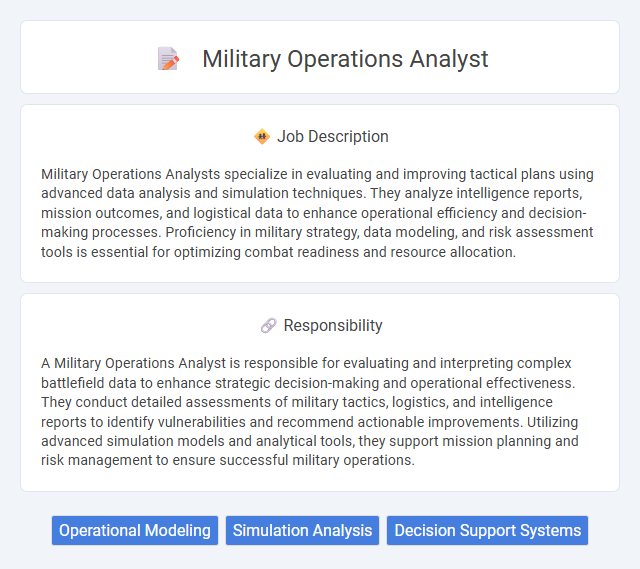
Military Operations Analysts specialize in evaluating and improving tactical plans using advanced data analysis and simulation techniques. They analyze intelligence reports, mission outcomes, and logistical data to enhance operational efficiency and decision-making processes. Proficiency in military strategy, data modeling, and risk assessment tools is essential for optimizing combat readiness and resource allocation.
Individuals with strong analytical skills and an interest in defense strategies are likely suited for a Military Operations Analyst role. Those who thrive under pressure and can interpret complex data to assist decision-making may find the job aligns well with their abilities. Conversely, people who struggle with detailed analysis or high-stress environments might face challenges in this profession.
Qualification
Military Operations Analysts require a strong background in military science, strategic studies, or related fields, often supported by a bachelor's or master's degree. Proficiency in data analysis, operational research, and familiarity with defense technologies and intelligence systems are essential for effective mission planning and threat assessment. Critical thinking, problem-solving skills, and experience with simulation software or geographic information systems (GIS) enhance an analyst's ability to optimize military strategies and outcomes.
Responsibility
A Military Operations Analyst is responsible for evaluating and interpreting complex battlefield data to enhance strategic decision-making and operational effectiveness. They conduct detailed assessments of military tactics, logistics, and intelligence reports to identify vulnerabilities and recommend actionable improvements. Utilizing advanced simulation models and analytical tools, they support mission planning and risk management to ensure successful military operations.
Benefit
Military Operations Analysts likely experience enhanced decision-making capabilities by utilizing data-driven insights to optimize mission outcomes. They may benefit from increased strategic influence within defense organizations, contributing to national security objectives. Their role probably offers opportunities for professional growth through exposure to advanced technologies and continuous training programs.
Challenge
A Military Operations Analyst likely faces complex challenges in interpreting vast amounts of intelligence data to provide accurate and timely strategic recommendations. The role probably demands adapting to rapidly changing battlefield conditions and anticipating enemy movements with limited information. Navigating the pressure of high-stakes decision-making environments appears essential to successfully supporting military operations.
Career Advancement
Military Operations Analysts play a critical role in evaluating and improving defense strategies using data-driven insights and advanced analytical tools. Expertise in combat modeling, simulation, and intelligence analysis enhances opportunities for promotion to senior analyst, operations manager, or strategic planner positions within defense organizations. Continuous development of technical skills, such as proficiency in geospatial analysis software and experience with joint military operations, accelerates career progression and leadership potential in the field.
Key Terms
Operational Modeling
Military Operations Analysts specializing in Operational Modeling utilize advanced simulation techniques and data analytics to assess and predict battlefield scenarios, enhancing strategic decision-making. Proficiency in developing and validating complex war-gaming models enables accurate representation of combat operations, logistics, and resource allocation. Expertise in computational tools such as MATLAB, Python, and specialized defense modeling software supports scenario planning and risk analysis critical for military effectiveness.
Simulation Analysis
Military Operations Analysts specializing in simulation analysis utilize advanced modeling software to replicate battlefield scenarios, enabling strategic decision-making and risk assessment. They collect and interpret complex data sets to evaluate operational effectiveness and predict outcomes of military tactics under various conditions. Expertise in simulation tools such as MATLAB, Simulink, and specialized military simulation platforms is essential to optimize mission planning and support defense initiatives.
Decision Support Systems
Military Operations Analysts specializing in Decision Support Systems develop advanced analytical models and simulations to enhance strategic and tactical decision-making within defense operations. They utilize data fusion, predictive analytics, and real-time information processing to deliver actionable insights that optimize mission planning and resource allocation. Expertise in geospatial intelligence, operational research, and artificial intelligence algorithms is essential for improving situational awareness and operational effectiveness.
 kuljobs.com
kuljobs.com